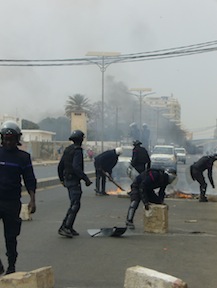Senegalese Students Call for President to Step Down

The friends of slain Senegalese student protester, Mamadou Diop, say that the 32-year-old master’s student was against injustice and that is why he was protesting against President Abdoulaye Wade’s bid for a third term of office.
On Jan. 31, the opposition movement and local protestors, including students, gathered at the Place de Obelix to voice their anger at the Constitutional Councils’ validation of Wade’s bid for a third term. The incumbent president is 85 and has ruled Senegal since 2000.
The protests turned violent and one student, Diop, was killed. Diop’s best friend and classmate, 29-year-old Bacary Sejnane, told IPS that he saw his friend’s death on television.
'I saw a very big police car approach where the crowds had gathered, and we saw a man on the floor. He tried to get up but he couldn’t. We saw that the car ran over him,' said Sejnane. 'When they said his name on television, it was Mamadou Diop, my friend.' According to Senegal’s Red Cross, the vehicle that ran over Diop was a water cannon truck.
Diop was completing his Masters in Modern Literature at the Sheik Anta Diop University, and was a devoted disciple of a popular section of the Mauride, a strain of the Muslim brotherhood with many followers in Senegal.
He had a wife and two young daughters. He loved to study and was a leader in his class and worked tirelessly to improve learning conditions at the university.
'He was against injustice,' said Sejnane reflectively, 'That’s why he was at the Place de Obelix.'
Diop was a well-known student at the university, so when students heard of his death, they gathered in a group and marched to the hospital where his body was kept. The police stopped them and clashing ensued.
The avenue on which Sheik Anta Diop University sits saw scenes reminiscent of a civil war during the protest. Students barricaded parts of the avenue using whatever they could find; huge boulders, stones, and even wooden crates used as shop stalls by street traders.
Since the start of the Jan. 27 demonstrations, spearheaded by the June 23 Movement (M23), a movement of youth and civil society, four people including a police man have lost their lives and several others have been injured from clashes with police, Senegal’s Red Cross reported.
'I think that people are angry because they knew that President Abdoulaye Wade cannot take on another mandate,' said Chrystelle Ndaya a former student at the university, now an independent journalist. 'President Abdoulaye Wade is old and he must go. He doesn’t have the mind of a young person. People want change.'
'It’s the first time we start to see students revolting like this,' she said almost it disbelief.
The Constitutional Council’s decision, which also invalidated international singer Youssou N’dour’s bid for the top seat in government, has many Senegalese angered.
In addition, during the last three to five years of Wade’s administration life has become progressively harder for many Senegalese. The cost of basic commodities has more than tripled. Bread, oil, gas, petrol, rice and sugar are now very expensive for most Senegalese.
Ndaya said these commodities have become so expensive that some families can only afford one meal a day.
But Mamadou Ba, who is completing his Masters in Sociology at the Sheik Anta Diop University, thinks the issue is beyond bread and butter. 'I think it’s a moral issue, it’s about recovering some dignity and respect from a leader who has given us his word.'
Ba said that Wade had promised to step down from office, if Senegal’s citizens mandated him to.
'I think the students feel that if they let this one go by, without making sure that their anger is heard, it will be like agreeing to be lied to for the rest of your life,' he said.
'These protests were meant to give consciousness to the citizens, it is not calling people to violence,' said Ba, who has so far stayed away from the protests. 'But I think they know that if they show pictures of the opposition behaving violently, it might change people minds about who to vote for. Senegalese are not violent people, they are very quiet.'
M23 has vowed to maintain protests until Wade rescinds his candidacy for the Feb. 26 elections.
But Sjenane does not believe these revolts, as he calls them, can be compared to the Arab Spring protests seen in Egypt and other African countries. Because he says: 'Senegalese are not violent, we respect democracy and the rule of law.'
But it was the same rule of law that killed his friend. 'Police are here to keep order, and it’s good that they do, but sometimes people also need to express themselves,' he added in response.
© Inter Press Service (2012) — All Rights ReservedOriginal source: Inter Press Service
 Global Issues
Global Issues